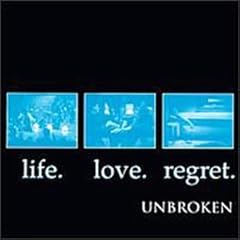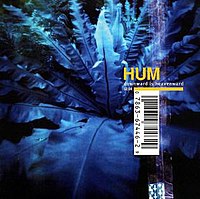Punk Planet Reviewer Spotlights
After lurking the blog of my email pen pal (and former Punk Planet colleague) Eric Grubbs, I've decided to post my reviewer spotlights from my tenure at PP. I was on the reviewer staff from December '05 to June '07. Toward the end I grew lazy and discontent writing about bad demos and other undesirable records, but now that Punk Planet has folded and I've distanced myself, I do miss it. So, for anyone interested, here are my spotlights. As you can see, I missed a few issues.

Unbroken - Life. Love. Regret.
Issue #72
Out of all the records released in the 90's, few have made more of an impact on the current state of hardcore than Unbroken's 1994 release, Life. Love. Regret. Prior to this record, Unbroken was just another heavy hardcore band like all the others of the era. However, in the process of making this album they took their collective influences and created something so vibrant and different from what their peers were doing that it has taken on this legacy all its own. Every aspect of this record is a piece that completes the entire package. The album cover consists only of three simple stills from the film Swing Kids and the words life, love, regret, unbroken. Inside, the liner notes read like a zine of journal style pieces about suicide, love, fear, and the uncertainty of growing up. Musically, Steven Miller, Robert Moran, Eric Allen and Todd Beattie set the backdrop for David Claibourn’s harsh vocal delivery. Miller and Andrew’s guitar tones are dark and heavy and though the songs aren’t the most technical, each riff captures the overwhelming current of helplessness that emanates through the album. The lyrics for “End of a Lifetime,” “Curtain” and “Final Expression” (and on the whole record for the most part) are bleak and frequently touch on the subjects of suicide, lost love and dying alone. Life. Love. Regret is catharsis for anyone who has ever been on the brink of disaster or felt the depths of depression. I know first hand the comfort and exhilaration this record can bring and I only hope that everyone can experience it first hand when they need it the most.

Chamberlain, The Moon My Saddle
Issue #73
In 1996 Chamberlain re-released their now classic LP, Fate’s Got a Driver. It was originally recorded and released a year prior under the bands former name, Split Lip. The change in name signified a turning point as they shed the skin of their former sound and look and grew into one shaped dramatically by Southern Indiana life. From that point the days of stage dives were replaced with cowboy boots and a self-awareness only matched by a few. The Moon My Saddle was the first proper Chamberlain full length and it reflected the years of hard work and growth of the band enormously. The lyrics, musicianship, artwork and recording form a cohesive package exemplifying the beauty and desolation of life in the Midwest. The punk rock foundation of earlier efforts was replaced by a strong backbone of American rock and roll, soul and blues. Vocalist David Moore put himself out on the line even more as an author writing tales of late nights, long drives, empty streets, open skies and a silence that only inhabitants of small towns know. I know the majority will always say that Fate’s Got a Driver is the superior Chamberlain LP, but as someone with roots grounded in central Illinois, I think I will always relate to The Moon My Saddle more.

Hum - Downward is Heavenward
Issue #74
In the mid-nineties when A&R people had their sights set on finding the next Smashing Pumpkins, their view landed a bit south of Chicago to the sleepy college town of Urbana, Illinois. It was there that Hum was born and uncovered long enough to land them a mini-hit in the single “Stars” off of their third proper full-length, You’d Prefer an Astronaut. However, after the gaze of record labels shifted, Hum was left to fend for themselves like so many other “one hit wonders.” After their brush with radio-rock fame, they faired well on the indie circuit and began to write what would become the best record of their career. Everything that You’d Prefer an Astronaut lacked (which wasn’t much to begin with) was more than made up for on Downward is Heavenward. Songs like “The Inuit Promise,” “Green to Me” and “Comin’ Home” exemplified the tug of war between devastatingly heavy and hauntingly melodic Hum always toggled with. “Ms. Lazarus” and “Apollo” showcased how a few simple riffs in the clean channel can still be as crushing as a song written in drop tuning. Like with all of their records, the themes of space, science, mathematics and nature run throughout the record as metaphors for life, love and dreams that have yet to be realized. Unlike many of my favorite records that have specific seasonal memories, I can listen to Downward is Heavenward any time of year, at any time of day, for hours on end and still not get tired of it.

American Nightmare - S/T
Issue #76
Before the name changes, inflated merch prices on Ebay and legal battles, American Nightmare were just another hardcore band from Boston. They had some buzz early on, but this seven song 7” is what really catapulted them into being one of the biggest bands in hardcore. The music is fast, well-written, straight forward hardcore, but what captured everyone’s attention were singer Wes Eisold’s lyrics. At the age of 20 he articulated his thoughts on love, friendship, depression and growing up in descriptive metaphors and imagery in a fashion not typically seen or heard in hardcore. It was honest and interesting and spoke volumes to kids like me who felt the same way. In my opinion, this 7” is one of the most important hardcore records of the past six years not only because of how good the songs are, but for the impact it’s had on hardcore since. Eisold’s influence can be seen in the sea of bands that came after this record, but also bands like Bane who existed before them. And though it is my favorite American Nightmare record, it was merely a stepping-stone for the boundaries they pushed and the band they became.

The Magnetic Fields - The House of Tomorrow
Issue #77
A few years before Stephin Merritt composed his three-disc opus, 69 Love Songs, he released the frequently overlooked House of Tomorrow EP. In comparison to his later work, the five songs here are hardly as grand or ambitious, but they are warm and endearing. Each song is roughly two and a half minutes of looped sampler beats and sporadic instrumentation with Merritt’s trademark baritone as the guide. In fact, if it weren’t for lyrical variation the songs would go nowhere as there is no musical transition. Like most of his records, the subject of love is predominant throughout the record and Merritt’s metaphors and poetics are at a peak with lines like, “You and me in the waiting room, of a disused railroad station, scavenging for a few antiques. We’ll make a fortune just have patience. If we find an old signal box you can write your dissertation.” House of Tomorrow is not the crowning jewel of Stephin Merritt’s prolific career, but it is a diamond in the rough worthy of discovering.
Labels: American Nightmare, Chamberlain, Hum, Magnetic Fields, Punk Planet, Unbroken

